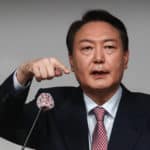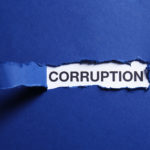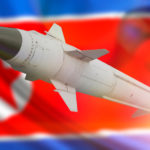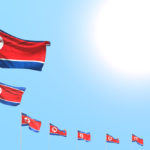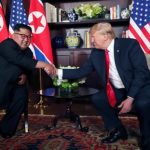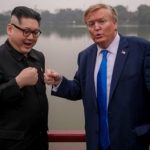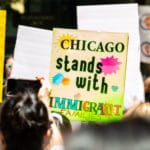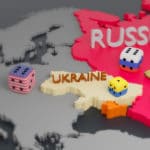Mass demonstrations in North Korea against US on Korean War commemoration day
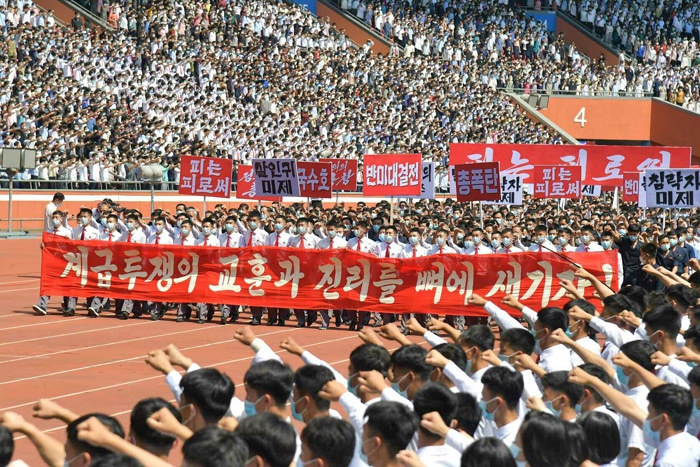
A mass rally organized by the regime was held Sunday in the North Korean capital of Pyongyang to commemorate the Korean War. Some 120,000 people attended, according to North Korea’s state news agency KCNA.
Images released by the state press showed North Koreans marching through a stadium and carrying banners with texts such as “the entire US mainland is within range of our missiles” and “the imperialist US is destroying peace,” among others.
The demonstration comes shortly after a telephone conversation between U.S. Secretary of State Blinken and his South Korean counterpart Park. Among other things, the two spoke about Blinken’s recent visit to China and his meeting with Chinese President Xi.
NEW: Over 100,000 North Koreans were organized into mass anti-America rallies across the nation, filling Pyongyang’s May Day stadium with posters, chants and other propaganda celebrating the "Day of Struggle Against U.S. Imperialism," a Korean War holiday in the country pic.twitter.com/h0NNXFi5yU
— NK NEWS (@nknewsorg) June 25, 2023
North Korea nuclear program
North Korea’s nuclear program has been a subject of international concern and scrutiny for several decades. The country’s pursuit of nuclear weapons has caused tension in the region and led to numerous diplomatic efforts to curb its nuclear ambitions. However, it is important to note that the information I can provide is based on data available up until September 2021, and there may have been new developments since then.
North Korea’s nuclear program began in the 1950s with assistance from the Soviet Union. Initially, the focus was on developing nuclear power for civilian purposes, but over time, it shifted towards developing nuclear weapons. In 2003, North Korea officially withdrew from the Nuclear Non-Proliferation Treaty (NPT), which was aimed at preventing the spread of nuclear weapons.
The country’s nuclear program gained significant attention in 2006 when North Korea conducted its first nuclear test. Subsequent tests were carried out in 2009, 2013, 2016, and 2017. These tests demonstrated advancements in North Korea’s nuclear capabilities, with each test achieving higher yields and indicating progress in their nuclear weapons program.
North Korea’s nuclear program has faced widespread condemnation and led to several rounds of United Nations (UN) sanctions. These sanctions are designed to restrict North Korea’s access to resources, technology, and financing that could further its nuclear program. However, these sanctions have not been entirely successful in halting North Korea’s nuclear activities.
The country has pursued various methods to develop its nuclear weapons program, including uranium enrichment and plutonium reprocessing. Uranium enrichment involves the production of highly enriched uranium (HEU), which can be used in nuclear reactors or as fissile material for nuclear weapons. Plutonium reprocessing involves extracting plutonium from spent fuel rods, which can also be used for nuclear weapons.
There have been concerns about the transfer of nuclear technology and expertise from North Korea to other countries or non-state actors. In the past, North Korea has been accused of involvement in proliferation activities, including assisting other countries in developing their own nuclear programs.
Efforts to curb North Korea’s nuclear program have primarily involved diplomatic negotiations, particularly the Six-Party Talks involving North Korea, South Korea, China, Japan, Russia, and the United States. These talks aimed to address North Korea’s nuclear program through dialogue and negotiation, offering economic and political incentives in exchange for denuclearization. However, these negotiations have experienced setbacks and have not yet achieved a permanent resolution.
It is important to note that the situation regarding North Korea’s nuclear program is complex and constantly evolving. The international community continues to monitor and engage with North Korea to address the issue and seek a peaceful resolution.
Current development
According to the South Korean Foreign Ministry, the allies agreed to stay in close contact over China. In addition, the two countries hope Beijing can persuade Pyongyang to move toward denuclearization.
North Korea conducted regular tests in recent months with various types of weapons, including intercontinental missiles. In late May, the country tried unsuccessfully to launch a military spy satellite. The developments led to increased diplomatic tensions between North Korea, neighboring South Korea and the US.
The Korean War broke out Sunday exactly 73 years ago, in 1950. During the war, the North was supported by the Soviet Union and South Korea by the United States. Formally, the countries are still at war with each other.

